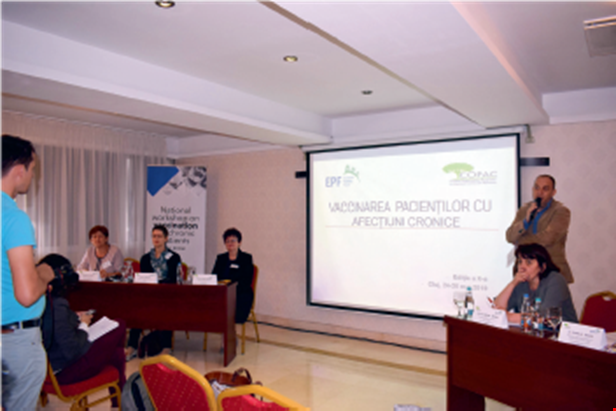Vaccination for patients with chronic conditions

Article for European Files, written by EPF President, Marco Greco
Vaccination does not just concern children: it is something that benefits people of all ages. A life-course approach to vaccination as part of universal health coverage can enhance people’s quality of life, including that of people living with chronic diseases. For society and governments, there may be significant savings for health and social systems from reducing the burden of chronic as well as vaccine-preventable diseases – for example by avoiding unnecessary hospital admissions through better management of chronic conditions in the community and by reducing the impact of antimicrobial resistance and thus costs associated to it. Vaccination should thus be considered a part of universal health coverage.
Vaccination is particularly important for patients with chronic diseases and long-term health conditions, such as diabetes, respiratory illness and heart failure. Their numbers are increasing, especially as people become older. Many of these patients are at higher risk of catching infectious diseases; complications of common infectious diseases can be much more serious for them. Vaccination recommendations exist for many conditions, but the uptake of vaccination by patients is lower than it could be.
In addition, some patients are vulnerable either because their immune systems are weakened by disease or they are undergoing therapy that weakens it. Patients with auto-immune conditions, or people with organ transplants, sometimes cannot be vaccinated at all, so they depend even more than other people on effective community (herd) immunity. Those patients are put at particular risk by the falling rates of vaccination in the population.
The European Patients’ Forum started engaging its membership on this topic in 2018, first by conducting a short survey to explore awareness and attitudes to vaccination, and then by producing a toolkit of information and advocacy resources. Three national workshops have been held – two in Romania, and one in Germany. Our work has highlighted some issues, including: patients’ lack of awareness of specific recommendations for their chronic condition; vaccination not being integrated properly as part of the treatment pathway; some degree of hesitancy in the patient com-munity; and practical access barriers such as availability and cost.
Patients look to both traditional and increasingly social media for information. Many say there is not enough easy-to-find, trustworthy and easily understandable information on vaccination for specific chronic conditions. Patients also want to know more about the benefits and risks of vaccination specifically for them, i.e. understanding the benefit/risk of each vaccine in their personal context, including the risk of not being vac-cinated, so that they can make an informed decision that is right for them.
The EPF Manifesto on vaccination for patients with chronic diseases calls for action to improve patients’ access to vaccination, as well as better targeted information. Vaccination should be included in disease management plans and clinical guidelines, and pro-fessionals should routinely check their adult patients’ vaccination status and offer vaccination if needed. Patients’ barriers to access vaccination in different countries, including availability and cost, should be tackled.
Patients are also concerned about low vaccination uptake and hesitancy among healthcare professionals. Inconsistency or negative attitudes can undermine the trust relationship between patient and healthcare professional, so it is vital that professionals give a consistent, solid, evidence-based message across professional groups, and set an example. The EPF believes that developing col-laborations between healthcare professionals’ and patients’ organisations in this regard is a vital step forward.
